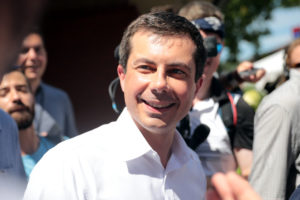Trump Wants to Make the 1 Percent Even Richer—and Use Washington’s Deceptive Language to Do It
Political economist Michael Hudson explains how economic terms such as “capital gains” are deployed to mislead the public about who is benefiting from economic policy and where the wealth is going.The political economist Michael Hudson explains how economic terms like “capital gains” are deployed to deceive the public about who is benefiting from economic policy and where wealth is going.
A rushed transcript provided by The Real News Network follows.
—Posted by Alexander Reed Kelly
Transcript:
SHARMINI PERIES, TRNN: Welcome back to the Real News Network. I’m Sharmini Peries coming to you from Baltimore.
Today I’m being joined in our Baltimore studio by economist Michael Hudson. Michael has a new book out J is for Junk Economics: A Survivor’s Guide to Economic Vocabulary in an Age of Deception. Michael is a distinguished Research Professor of Economics at the University of Missouri, Kansas City. Thanks so much for joining us Michael.
MICHAEL HUDSON: Good to be here in your Baltimore studio.
PERIES: Thank you. So Michael, in the first segment we spoke more generally in terms of how people are misled through our policy makers in Washington in particular. But give us some specific examples of some of the terms used to mislead us.
HUDSON: Well take the word capital gains. People originally think capital gains, you have the image of industry growing and innovation taking place. There’s an indication as if somehow when real estate and housing prices go up, everybody’s getting richer. When the stock prices go up, the economies got richer. So Hillary Clinton was able to say, look at how the stock market soared in the last 8 years thanks to Mr. Obama.
Well the stock market has soared but not the employees working conditions for the stock market. Most of these capital gains don’t simply reflect what the textbooks say. The textbooks say, well a company’s worth whatever it’s expected future earnings are. So the reason stocks are going up and bonds are going up and real estate is rents are going to go up and profits are going up and the economy is expanding and everybody’s getting richer. But that’s not why the stock market goes up at all.
The stock market has gone up since 2008 in America, in Europe, all over the world because the central banks have flooded the economy with creating new money. They didn’t create the money to hire workers. They didn’t create the money to build infrastructure, they didn’t create the money to invest in the economy. They didn’t create the money to pay off the mortgages of people who had junk mortgages and were exploitive. They didn’t create the money to write of student loans. All the money that was created, every penny, was created to give to the banks. To the Wall Street banks at 0.1% interests to create reserves at the Federal Reserve so that the banks could then lend out money and what did they do to who did they lend it to?
Well they lent to corporate [raiders]. So, part of the reason the stock market has gone up is that corporate [raiders] have borrowed very inexpensively 1%, say from a bank, and bought companies whose dividend rates are 3% or 4 or 5% and they get what’s called the arbitrage, the difference. So all of a sudden you have the take over a company with borrowed money. As a result of paying interest to the banks and this borrowed money, you don’t have to pay income tax on it because this is counted as a cost of doing business, not as a cost of takeover.
The first thing they do is tighten working condition. They work the labor harder. They let the labor force go. When people retire, they don’t hire new workers. They just work the remaining workers all the more. So, what’s happened isn’t a new investment. It’s just the opposite. It’s disinvestment. It’s asset stripping. What creates the stock market going up is not capital formation. It’s asset stripping. When Donald Trump calls that wealth creation, it means his wealth- meaning the money he’s been able to make. But that money has been made by making the economy poorer.
So, when people talk about the economy, they have to realize that it’s actually money layers. Not everybody is a millionaire working on Wall Street. Some people actually have to work for paychecks and out of their paychecks they have to pay rising healthcare costs, rising money to the banks, rising debt service. They have to borrow more money just to break even. Their rents are going way up to larger portions of their income.
So, what people are actually left with to spend is maybe 25 to 30% of their income on goods and services after paying taxes and after paying the FIRE sector (Finance, Insurance, Real Estate). Whether it’s housing insurance or mortgage insurance. So there’s an idea of distracting people. Don’t think of your condition. Think of how the overall economy is doing. But don’t think of the economy as an overall unit. Think of the stock market as the economy. Think of the rich people as the economy. Look at the yachts that are made. Somebody’s living a lot better. Couldn’t it be you?
Well they don’t explain why it’s not you. The reason they’re living better is what used to be called a transfer payment. Something that is not really earned but it’s just a transfer of income like from a rent when a landlord will raise the rent, all of a sudden, same house, nobody’s invested more. Nobody’s saying oh your rent’s going up about $50 a month this month. No that’s a transfer payment. You just have to pay more. The landlord didn’t do anything to earn that more money. He just found that he’s able to squeeze more money out of you.HUDSON (cont.): So squeezing money out of you to make money for a [inaud.] class and that was a word that used to be used 100 years ago, the [inaud.] were people who lived on rents. They were coupon clippers, they were landlords, they were the idle rich who inherited money and somehow you have like even the words widows and orphans. People say you have to provide large capital gains, meaning debt financed asset price inflation so that the widows and orphans can survive. The widows and orphans are all living on trust funds. Or they’re living on alimony. Or they’re living on inherited wealth. People forget that before 1900, widows and orphans used to be poor people. We’re talking Charles Dickens type novels. Widows and orphans were the people who needed welfare. They weren’t the millionaires.
So today when people talk about widows and orphans, they mean millionaires. When they talk about the low interest rates that capitalists aren’t making to get rich enough, that’s really hurting the pension funds. Our hearts bleed for the workers. Their hearts aren’t bleeding for the workers. They’re trotting out pension funds in front of their factotums to say, make the pension funds richer and behind them, the fact is that 75% of all the stocks and bonds are really owned by just a small percentage of the American population they’re really talking about themselves.
So, you have the economic vocabulary turning into vocabulary of deception. So, I go over what this vocabulary is and what the concepts are and I also talk about what the original concepts were in classical economics. Everyone from Adam Smith, John Stewart Mill, they were all reforms. What they wanted to reform was getting rid of this parasitic landlord class that had conquered England in 1066 and it’s the heirs of the military of the warlords ended up taking the land and just making everybody pay them and all of their descendants for not doing anything. Just for being conquered.
You could say that the carry over of this today. The rent that people have to pay, the money they have to pay the banks instead of having a public option. That’s the price they still have to pay for being conquered. The group that I’m working with is trying to promote public options. We’re trying to promote public banking that would provide credit cards, banking services, [vanilla] services at a fraction of the price that Chase Manhattan or Citi Bank or Bank of America charges.
Yea all these charges that people pay are economically unnecessary. There’s no real cost behind them. There’s no value behind them. So, they’re what the classical economist called empty pricing. Prices with no real cost value. What they called fictitious capital. Capital that clings on junk mortgage borrowers that actually, the pretense that all these debts can be paid but it’s all fictitious because everybody knows at least on Wall Street everybody knows that debts can’t be paid. That somebody has to default and Wall Street’s plan is well make the government reimburse us like the bailouts that happened in 2008 so that we don’t lose, let’s pass all of the loss onto the tax payers without changing the banks, without throwing our guys in jail even though these were fraudulent mortgages.
PERIES: And the government itself doesn’t pay its debt.
HUDSON: That’s right. The whole idea is that it doesn’t. At least if it does pay the debt, it only pays – there are two kinds of debts that the governments have. They have a debt to the bond holders and they do pay that. They have a debt to the social security recipients. Hillary promised she was going to cut back social security. She was going to cut back social spending and social security and medical care so that the government would have enough money to pay her backers on Wall Street. So she was Obama’s legacy. A standing for Wall Street.
A stand in is a politician who can deliver her constituency to her Wall Street backers and that’s what a politician does in America. You get a constituency; you make them believe your promises and then you turn them over to your financial campaign backers. That’s what politics has become and that’s as much an art of deception as economics is.
PERIES: Now Donald Trump is proposing to spend trillions of dollars in terms of infrastructure development in this country. That sounds very good. Of course, in the immediate future that means jobs for people. But what is the problem with that kind of infrastructure development in the long term and what kind of plan is he thinking of when he’s thinking infrastructure development?
HUDSON: There are many ways of building infrastructure. The way Donald Trump would like, he’s like to spend like a hundred million dollars building a new bridge in the highway. Then he would like to sell it, privatize it to a private buy like himself for 10 million dollars. So, the government would spend a huge amount of money that could’ve been used for a free bridge or a free road. He’ll then sell it for 10 million dollars to a private owner and then the private owner will put a toll booth up and charge money for coming across and make a mint.
This is what happened in England under Margaret Thatcher. This is called Thatcherism and it’s what destroyed the English economy. It’s what’s destroying the European economy and turning Europe into a dead zone. So, you could do infrastructure in the way of a giveaway. A real infrastructure would be the government would indeed pay for rebuilding this. But the whole idea of what mad America rich in the 19th century was the government will develop this infrastructure and it will provide these services freely to the population. Because if you begin to charge people for bridges and for roads and for parking meters as is in Chicago and for everything else that’s being privatized, you’re going to have even higher costs of living and the wages are going to go up and it will be even harder to compete with foreign countries and to make exports because nobody can afford to pay the prices that the American workers have to pay just to live and export in competition with Asia or even Europe or Germany.
Germany doesn’t have all of these costs. Germany has very low rental charges. Maybe 10-15% of your income. Not 40% as here. Low priced public health, free autobahn to drive on. Not at all like this. So, Donald Trump wants essentially to double the cost of living for everybody and give the capital away to his republican backers and essentially leave the whole country unemployed but the 1% is going to be very, very rich.PERIES: Right. Now let’s go back to some specific examples in terms of the kind of infrastructure that Donald Trump wants to build. So, he wants to build new airports. He says our airports are outdated. He wants to build new roads and new bridges and build a wall over the US-Mexico border. All of these are considered infrastructure. In the past we’ve been told that public-private partnerships are actually a good thing. It even sounds good, public-private partnerships for the betterment of society. But it really isn’t and in terms of myth making, where does this take us?
HUDSON: The word public partnership it’s really a one way partnership. The private, tells the government what to do. All of the costs are born by the government. All of the risks and the profits go to the private sector. It really means we’re creating an opportunity for banks to make a killing on making loans for all of this will be financed by bank credit. That banks or bond holders are going to be paid very high interest rates on.
The government could create all this money the same way banks do. The government has computer keyboards which is how a bank creates money. They could create their own money without having to pay interests to anyone. They could either charge the airlines for it or they could provide the airports more freely but public partnerships are designed to quadruple or quintuple the actual costs of doing business and pretend that this is in the public interests instead of just in the interests of the banks and the corporate insiders that the banks are willing to leave money to.
If you look at investigative journalists looked at just one horror story after another of private public partnerships. Look at London’s railroads. Look at what England did with the railroads. Water. Public Private partnership for water. People now have to pay huge amounts just to get water in England, that used to be free. The transportation quality goes down. The price goes way up. So the partnership is a very exploited. We’re not talking about equal partnership. We’re talking about a dominate submissive sadomasochistic partnership.
PERIES: Then this point you were making about the government can print all the money they want if they want to invest it in infrastructure and own that infrastructure, they can make money to then pay back the treasury if they need to. But instead they’re going to borrow the money from these banks and then be indebted. So is this kind of debt a bad thing?
HUDSON: Well the debt is bad when you have to repay it. All new money is a kind of debt. All money is created on a computer. You can look at it in terms of a balance sheet. When you create, when you go into a bank and you want a loan, the bank will give you a bank deposit and you’ll sign a promissory note. The bank has an asset and you have a debt to the bank and you can spend your deposit anyway. But the bank charges money for all of this. The government can do the same thing. The Federal Reserve and the Treasury. The Treasury can just print, issue a 1 trillion dollar coin for instance. Give it to the Federal Reserve and the Fed can issue notes about it. You could call to claim whatever you want. It’s all constitutional because you can assign any level price you want to a coin. All money is just created artificially.
So, it’s a monopoly it’s a legal privilege and for thousands of years from Mesopotamia through Greece and Rome, all the money was created by the temples to make sure that it was honest money. But it was all privatized after over thousands of years of history and now banks charge for something that the government can do for free.
PERIES: Michael, for Donald Trump and the Republicans, they are against creating debt aren’t they?
HUDSON: No. They know that most people are afraid of going into debt. Because if you go into debt you actually have to repay it. Government debt doesn’t have to be repaid. If you repaid government debt, there wouldn’t be anymore money. What they’re really looking for is – the way to cut debt is by cutting the deficit and what we want to cut is social security. We want to a sort of downsize it. Hillary wanted to put it into the stock market. We want to pay less social spending. We want less medical care. We want to spend less money on the 95% of the population so all the money gets spent on the top 5%.
So, they’re really against what debt is spent for. They’re against democratic debt. They’re against democracy. What they really want is oligarchic debt which used to be state socialism. Government will only give money to the banks. They’re all for the kind of debt that is the bank bailout in 2008. They’re all for giving money to Wall Street. They’re all for giving subsidies to Donald Trump for building his buildings in New York and enabling him to make a killing. They’re just against giving debt to the workers or to the middle class or to the cities or to anyone who’s not one of the 5%.
PERIES: Alright so this is the kind of austerity plan that Paul Ryan –
HUDSON: Austerity is the word.
PERIES: – is trying to promote that he wants Donald Trump to sign onto.
HUDSON: Right.
PERIES: Alright Michael I thank you so much for joining us today. And thank you for joining us on the Real News Network.
Your support matters…Independent journalism is under threat and overshadowed by heavily funded mainstream media.
You can help level the playing field. Become a member.
Your tax-deductible contribution keeps us digging beneath the headlines to give you thought-provoking, investigative reporting and analysis that unearths what's really happening- without compromise.
Give today to support our courageous, independent journalists.






You need to be a supporter to comment.
There are currently no responses to this article.
Be the first to respond.